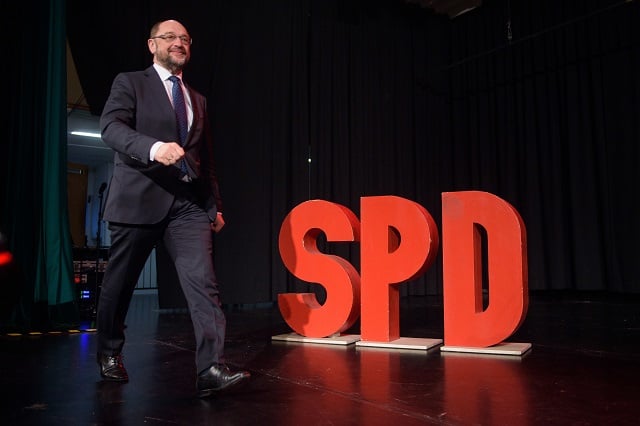The bearded Social Democrat, already credited with giving his ailing party a strong shot in the arm, will be anointed SPD leader and standard bearer at a one-day congress in Berlin.
German media predicted he could garner more than 90 percent of the vote from the country's oldest political party.
In a speech to the SPD rank and file, Schulz will attempt to harness his momentum against Merkel, whose conservatives just a few months ago had an apparently invincible lead in the polls. Speaking on Saturday, Schulz said he hoped to win a vote of confidence with the backing of “a large majority” of party faithful.
His decision to leave the European Parliament, which he headed for five years, and run to lead Germany has given the Social Democrats a new lease of life since party leader Sigmar Gabriel asked him to take the reins in January.
“It's been encouraging to see in the last few weeks that people are hopeful again that the Social Democrats have a shot,” Schulz told Berlin public radio RBB this week.
“My intention to pursue policies that make the lives of hard-working people a little better is apparently finding a lot of support.”
Opinion surveys have recorded a 10-point jump for the SPD in recent weeks and some polls put it ahead of the conservative bloc of Merkel, who is trying to win a fourth term.
The congress will fire the starting gun for the national election campaign and the race for three state polls, the first of which will be held in Saarland on the French border on March 26th.
Fired-up fans
Ahead of the congress, Schulz won a nod of support from EU Commission chief Jean-Claude Juncker who, despite his centre-right stance, has had a somewhat tense relationship with Merkel.
“Both Martin Schulz and Angela Merkel have the qualities to be chancellor,” he told Bild newspaper on Sunday.
The Social Democrats, junior partners in Merkel governments for nearly eight of the last 12 years, long withered in Merkel's shadow.
But Gabriel, now Germany's foreign minister, told supporters this month that Schulz's entry into the race as a Berlin outsider appealed to many SPD voters who are tired of the “grand coalition”.
“He embodies the feeling of Social Democracy, in his head and above all in his heart,” Gabriel said.
For his part Schulz, 61, attributes his surge to a sharpened focus on their classic bread-and-butter issues including wealth redistribution, free education and gender equality.
He has in the process become something of a social media phenomenon, inspiring a raft of affectionate hashtags and viral videos among his fired-up fans.
Heal the divisions
Schulz's unique life history – he wanted to be a professional footballer, didn't finish high school, beat alcoholism before opening a bookstore and taught himself five languages – gives him a common touch.
He has faced attacks by conservatives that he has adopted a “populist” tone but he dismisses the charges as elitism.
“I speak in a way so you can tell me apart from my rivals, and I try to make complex ideas understandable for my audience,” he insists.
Party members are hopeful Schulz can help heal the divisions stemming from a programme of labour market reforms known as Agenda 2010 and passed by the last SPD chancellor, Gerhard Schroeder, who lost to Merkel in 2005.
The unpopular measures were successful in driving down unemployment but also a key factor in the party's bitter and lasting gulf between centrists and leftists.
Schulz, stressing his humble roots, has pledged to soften some of its key planks, including lengthening the period of time the jobless are entitled to full benefits.
Meanwhile Merkel, a frequent winner of Forbes magazine's most-powerful woman ranking, said she was not troubled about the wind in the SPD's sails, noting that there had always been potential in its “very meagre poll ratings”.
“Competition enlivens things,” she told Friday's Saarbruecker Zeitung.
By Deborah Cole




 Please whitelist us to continue reading.
Please whitelist us to continue reading.
Member comments